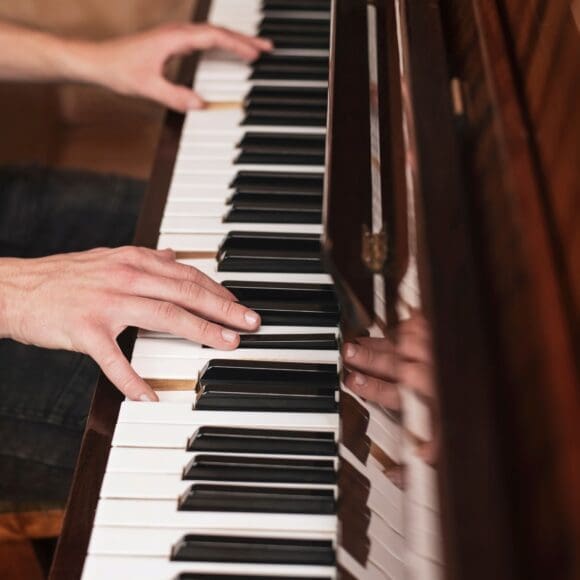
Grade exam, school talent show, concert hall recital or simply the thought of the neighbours being able to hear you practise – everyone experiences performance nerves at some point, no matter how much you love playing the piano.
If the thought of a public performance sets your pulse racing, don’t let it put you off. Instead, grab a cup of calming camomile and read on to discover how to control your nerves and why those tell-tale butterflies should no longer be viewed as the enemy…
Embrace your nerves
The first step towards controlling nerves is to understand them.
Think feeling nervous is a bad thing? Not so.
Nerves are your body’s natural way of helping you to do your best. And although it might not always feel like it, they can actually enhance performance.
Dry mouth, sweaty palms, and pounding heart are all signs your body is preparing to ‘fight or flee’ and are caused by an increase in adrenaline. This boost of stress hormone helps to sharpen reactions and increase focus – and who doesn’t want that before putting on a show?
Ok, so nerves can be useful. But we still need to be able to control them – even Chopsticks won’t sound great if your hands are shaking all over the place.
Learn to manage your nerves and you’ll begin to feel less apprehension ahead of a performance.
Let’s find out how.
Top tips to hold your performance nerve
· Be prepared
We’ve all heard the saying ‘fail to prepare and prepare to fail’. If at the back of your mind you secretly know you haven’t put the practise in, this sense of being underprepared will only serve to increase your anxiety levels.
Put the work in beforehand and you’ll have the confidence that comes with knowing you’ve done as much as you can.
If you have the opportunity for a dress rehearsal, take it. And if you’re playing a different piano, take time to work out how to adjust the stool, where you need it to be positioned, and familiarise yourself with the keyboard action and pedals. All small things but they can make a big difference to confidence when it comes to performance time.
· Get enough rest
If a big performance is looming it can be difficult to sleep and tempting to spend every spare moment practising, but getting enough rest is essential.
If sleep feels impossible, do something else that will help you to relax – take a bath, read a book, or get some fresh air – a gentle walk can release pent-up energy and help you to switch off and relax.
· Stay positive
Reason things out – what’s the worst that could happen? You stumble over a bar? Miss a note? Play the wrong note? Providing you don’t let this command the rest of your piece, it will be forgotten by the audience in seconds – so don’t let your mind dwell on it either or it will impact the rest of your performance.
If you’re playing for an examiner, remember they’re there to pass you. So don’t automatically think you’ve failed and that they won’t see past a mistake either. What they’re looking for is how you pick the piece back up and continue – so the most important thing is to carry on and not let the nerves take over.
· Own your nerves
Don’t fight the fear – embrace it!
Try to view your nerves as a positive – your body’s way of helping you to perform at your peak. Do this and it will prevent you from becoming overwhelmed.
Experiment with different techniques to help to manage your fear – deep breathing exercises, shaking out your arms and legs, and everyone’s favourite – picturing the audience naked!
· Do it more often
You might not like this suggestion, but one of the best ways to conquer performance nerves? Do it more often.
The more you put yourself in a situation that stresses you out the more accustomed to it you will feel. And, over time, the act of performing will start to feel much less daunting.
Regular performances – whether to friends and family or a paying audience – will also help you to understand what works (and doesn’t work) for you. You’ll be in a better position to understand ‘triggers’ that make you more anxious and what works to keep your nerves in check.

Things to avoid
There are lots of things you can do to master performance nerves but let’s not forget the things you shouldn’t do too. Such as:
· Overdose on caffeine
Prone to nervous hands? If you’re already shaking, overloading on caffeine isn’t going to help.
Try to stick to your normal routine – if you usually have one morning coffee, enjoy it, but don’t go in for a second!
· Skip breakfast
If you’re nervous, eating can be the last thing you feel like doing but food is your body’s fuel – without it, it’s impossible to perform at your best.
Skipping a meal may leave you feeling lightheaded and add to the queasy feeling in the pit of your tummy as show time approaches. So even if it’s just a banana or a biscuit, make sure you eat something.
· Over practise
Practise makes perfect but there comes a time when you just need to step back.
The day before a performance run through things a few times but then call it a day. Over practising will stress you out, stop you from sleeping and make your hands and body ache from too much time hunched over the keys repeating the same bars.
Step away from the piano and chill.
· Panic!
It’s finally time to play – the worst thing you can do now is panic.
Instead, remember how much you love playing the piano and try to focus on that feeling of pleasure. Zone out the audience and just enjoy the moment.
Have confidence in your instrument
Whether you perform using your own piano, or only use it for practise, having confidence in the capabilities of your instrument is a must.
With over 40 years in the piano trade, the knowledgeable team here at Richard Lawson Pianos can help you to find the right piano for both your playing needs and your budget.
All of our pianos are competitively priced and come with an impressive 5-year guarantee – on top of a 30-day trial period!
We also offer a professional tuning service to ensure that – no matter how nervous you are – your piano always performs at its best.
Browse our range of pianos for sale online. or get in touch today.














 Reviews
Reviews